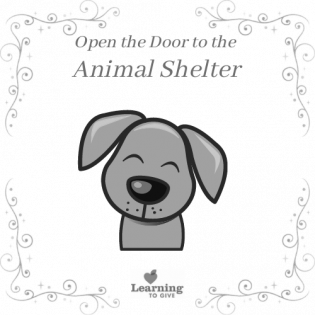Open the Door to the Animal Shelter
The "Open Doors to Your Community" project is a virtual door that guides young people to the actual door of local resources so they can learn about their community, take action, and build connections and understanding of their roles in community.
What Is the Purpose of an Animal Shelter?
Animals coexist in our communities with humans. Just like humans, animals have basic needs - food, water, shelter, and loving relationships. Animal shelters provide a service to ensure cats, dogs, and livestock receive these basic needs. They feed and bathe animals in their care, walk them daily, and give them vaccinations and medical care. They try to find new homes for animals and give new pet owners advice on care and training to make sure the relationship is good for life. Animal Control is responsible for enforcing laws related to animals. They may make sure livestock or pets are getting the care they need. They may take action if there is evidence of animal cruelty or neglect.
Meet the Animal Control Officer
In this brief video, we meet Sarah Colbrook from Mason County Animal Control in Ludington, Michigan. She shares how their organization takes care of animals and how young people can get involved with volunteering and raising money for an animal shelter.
Contact Your Local Animal Shelter
Look online for a local animal shelter, Humane Society, or Animal Control. Call to set up a phone or in-person interview. Tell them you'd like to learn more about the work of the program so you can get involved or volunteer to help their mission. Ask for 30 minutes or an hour of their time. The Interview Script linked here and below can help you make the call.Interview Questions
These questions can help you learn about your community and ways you can get involved.
- What is the main purpose of the animal shelter? This may be its mission or vision.
- What are some challenges in the community that the shelter seeks to address?
- What are some programs that address those issues?
- What can a young person do to raise awareness of their work, raise funds, or volunteer at the shelter?
Take Action in Your Community
Reflect on the work of the animal shelter programs in your community. What can you help them do? Your voice and time matter. The resources below can help you plan a project.
The best service-learning projects guide us to gain and use knowledge, are led by youth voice and passion, address a need, and develop connections with local resources over time.
 Learning to Give Issue Area Toolkits include background on the issue, community connections, lessons and activities, project ideas, and planning guides. Check out the Animals and Advocacy toolkit as well as the Humans and the Environment toolkit.
Learning to Give Issue Area Toolkits include background on the issue, community connections, lessons and activities, project ideas, and planning guides. Check out the Animals and Advocacy toolkit as well as the Humans and the Environment toolkit.
 Learning to Give Simple Safe Service guides provide directions for generous actions that encourage youth voice and promote the common good. Check out the Pet Toys from Recycled T-Shirts service project or the Family Donation Decision guide. This Advocacy Posters project may be used to call attention to the needs of the shelter.
Learning to Give Simple Safe Service guides provide directions for generous actions that encourage youth voice and promote the common good. Check out the Pet Toys from Recycled T-Shirts service project or the Family Donation Decision guide. This Advocacy Posters project may be used to call attention to the needs of the shelter.
 Learning to Give Literature guides combine selected literature with thought-provoking discussions and activities that teach about giving and civic engagement. Read aloud a picture book to a younger child or a retirement home buddy. This book Buddy Unchained is told from a rescued dog's point of view. Let's Get a Pup is a family story of pet adoption.
Learning to Give Literature guides combine selected literature with thought-provoking discussions and activities that teach about giving and civic engagement. Read aloud a picture book to a younger child or a retirement home buddy. This book Buddy Unchained is told from a rescued dog's point of view. Let's Get a Pup is a family story of pet adoption.
More about Pet Adoption and Animal Care
Fun Facts:
- Each year, about 10 million pets enter animal shelters across the U.S. About half of them will be euthanized because they do not get placed in a home.
- When animals are rescued, very few make it back to their original homes.
- About one-fourth of dogs in shelters are purebred.
- About 60 percent of households in the U.S. have a pet.
- Animal shelters rely on private donations for their funding.
Project Ideas for Young People:
- Build dog houses as proper shelter for adopted dogs
- Build cat trees to be donated to adoptive families
- Ask birthday party guests to bring items on the shelter's wish list instead of presents
- Volunteer at the animal shelter by cleaning, walking dogs, or playing with cats
- Make dog treats, toys, or blankets/beds


